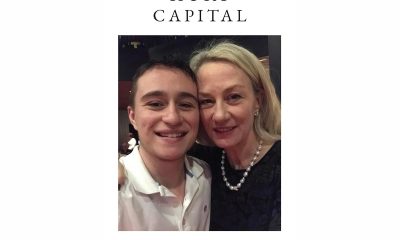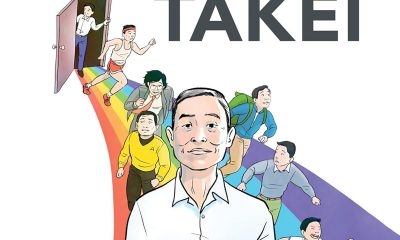Books
Best books to give as gifts this holiday season
History, activism, biographies — and Cher!
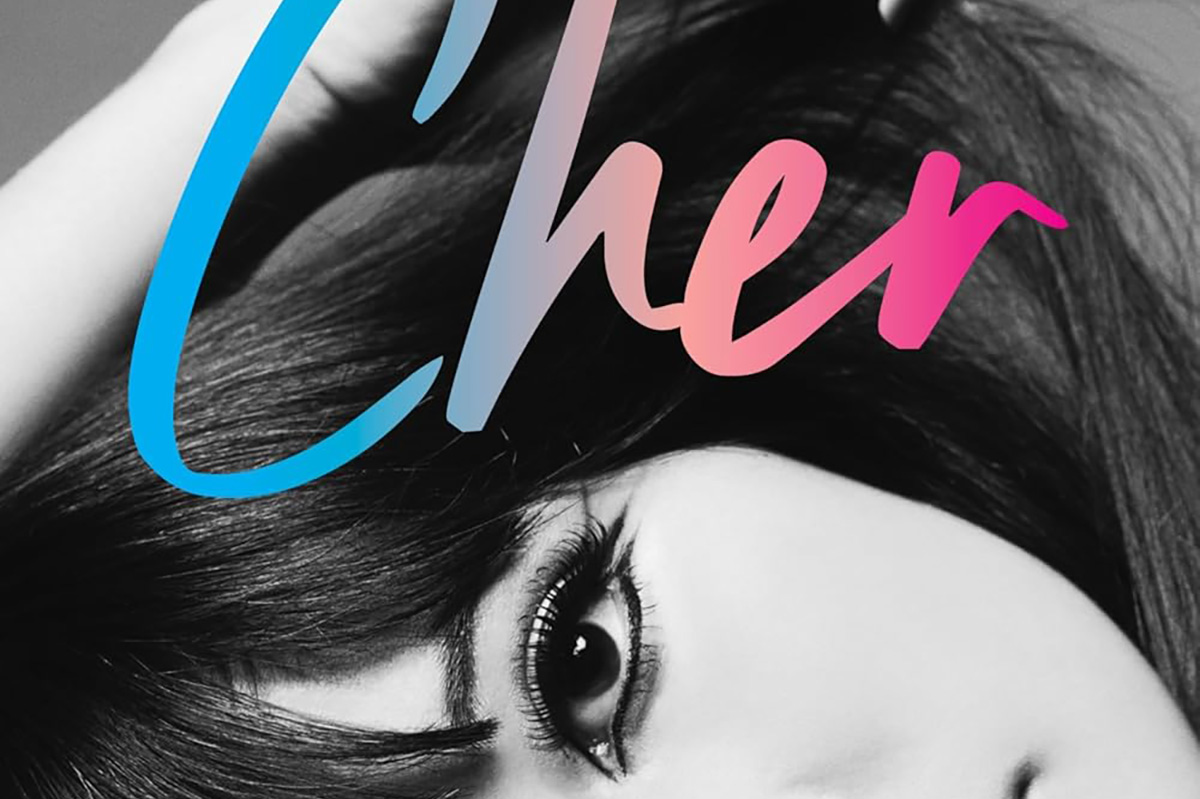
So you looked at the calendar the other day and — eeeek!
The holidays are almost here and you’re not ready. Out of ideas for gifts? How about a book?
Is there an activist for justice on your gift list? Then they’ll be happy to open “Morningside: The 1979 Greensboro Massacre and the Struggle for an American City’s Soul” by Aran Shetterly (Amistad, $28.99), It’s a story of the Klan, white supremacy, racial conflict, and how it fits in with what’s going on in America today. Pair it with “Sidney Poitier: The Great Speeches of an Icon Who Moved Us Forward” complied by Joanna Poitier, edited by John Malahy (Running Press, $29). Bonus: This inspiring book is packed with photos.
Fiction for the LGBTQ Reader
If there’s someone on your gift list who’d enjoy a coming-of-age story, “Shae” by Mesha Maren (Algonquin Books, $28.00) is a good choice to give. It’s a boy-meets-girl tale, but when a pregnancy happens, it spurs bigger changes in their lives than just parenthood.
If a fun little rom-com is what your giftee loves to read, then look for “We Could Be Heroes” by Philip Ellis (Putnam, $20). It’s a light tale of a chance encounter and a friendship that starts out small and becomes pretty super. You might want to wrap it up with “Love and Hot Chicken” by Mary Liza Hartong (Wm. Morrow, $30), a sweet, funny story of two Tennessee women, a chicken shack, and amour.
If your giftee loves rom-coms, there are a bunch to choose from this season. Consider “The Ride of Her Life” by Jennifer Dugan (Avon, $17.99), a girl-meets-girl novel of a new ranch-owning horsey-girl and the farrier who disagrees with her ranching ideas.
Nonfiction for the LGBTQ Reader
The person on your gift list who loves memoirs will devour “Cactus Country” by Zoe Bossiere (Abrams Press, $27.00), the story of an 11-year-old and a new start in which everyone sees him as the boy he is. But life as a trans boy isn’t easy in the beautiful area he’s come to embrace, and neither are the people who surround him. Wrap it up with “The Long Hallway” by Richard Scott Larson (University of Wisconsin Press, $21.95), a memoir of a boy who identifies with a movie monster who helps him see that hiding parts of himself can help him come to terms with who he is.
For the trans man or woman on your gift list, look for “The Last Time I Wore a Dress” by Dylan Scholinski and Jane Meredith Adams (Penguin Publishing), a story of abuse, bullying, mental anguish, and a happy ending. This book was first published more than 25 years ago but now has a new, satisfying and joyful ending. Wrap it up with “Mama: A Queer Black Woman’s Story of a Family Lost and Found” by Nikkya Hargrove, the tale of a love, responsibility, and more love.
If your giftee is exploring their sexuality, “Fierce Desires: A New History of Sex and Sexuality in America” by Rebecca L. Davis (Norton, $35) might be a welcome gift. Have we come a long way, in understanding people’s sexuality? Yes and no – your giftee may have ideas about that.
Biography
Did your giftee spend a childhood immersed in books about growing up? If so, they’ll cherish those memories when they read “The Genius of Judy” by Rachelle Bergstein (One Signal Publishers, $28.99). This biography fills readers in on who Judy Blume was, why she wrote the novels she penned, and how her stories fit in with today’s adolescence, feminism, current events, and literature. Wrap it up with this great biography: “Rulebreaker: The Life and Times of Barbara Walters” by Susan Page (Simon & Schuster $30). It’s the story of Walters, her times, and her impressive works.
If your giftee is riled by this year’s politics and feminism, then they’ll love reading “A Well-Trained Wife” by Tia Levings (St. Martin’s Press, $30). It’s the story of Levings’s life as a wife in a Christian patriarchy-based marriage, the submissiveness, the expectations, and her ultimate resistance. The right kind of giftee will love this book completely.
The British history lover on your list will absolutely want “The Eagle and the Hart: The Tragedy of Richard II and Henry IV” by Helen Castor (Avid Reader Press, $35). This book takes a deep dive into history, the lives of two cousins, and a shocking assumption to the throne. Pair it with a bookmark and “Henry V: The Astonishing Triumph of England’s Greatest Warrior King” by Dan Jones (Viking, $35), a book about the life and times of this English king in the fifteenth century.
For the person on your gift list who loves music, “How Women Made Music: A Revolutionary History from NPR Music” edited by Alison Fensterstock (HarperOne, $40) is exactly the right gift. It’s a look at female musicians from the 1920s to more recent years, from country music to hip hop to guitar players and beyond. Wrap it up with “I Heard There Was a Secret Chord: Music as Medicine” by Daniel J. Levitin (Norton, $32.50), a book about music and how it contributes to healing and well-being.
“Friendly Fire: A Fractured Memoir” by Paul Rousseau (Harper Horizon, $29.99) may be the exact right gift for anyone who loves a unique memoir. Just before he graduated from college, Rousseau was shot in the head accidentally. How he survived, both physically and in the friendship with the man who shot him is the basis of this very well-done book.
The science-minded person on your gift list will be happy to have “The Elements of Marie Curie: How the Glow of Radium Lit a Path for Women in Science” by Dava Sobel (Atlantic Monthly Press, $30). Chances are, your giftee knows exactly who Madame Curie was, but do they know about the women who came after her in the laboratory. This book tells the tale in an engaging, interesting way.
For your fashionista who loves make-up, “Becoming Elizabeth Arden: The Woman Behind the Global Beauty Empire” by Stacy A. Cordery (Viking, $35) could be the best gift beneath the tree this year. It’s a sweeping story of a businesswoman, glamour maven, revolutionary, visionary, her work, her times, and the controversy she lit.
And don’t forget queer icon Cher’s new book, “Cher, The Memoir Part One,” filled with no-nonsense anecdotes about her rocky rise to fame. Fellow queer icon RuPaul also published his biography earlier this year, “The House of Hidden Meanings: A Memoir.”
Politics
Was your giftee dismayed at the political landscape for the past few years? Then “Good Reasonable People” by Keith Payne (Viking, $29.00) should be the book you wrap up to give. There is a way back to unity and away from polarization, Payne says, and with an explanation of the psychology and behind it, it’s do-able.
Be sure you know where your giftee’s politics lie if you wrap up “The MAGA Diaries” by Tina Nguyen (One Signal Publishers, $28.00). Nguyen cut her teeth in the conservative movement, though she never felt entirely comfortable there. Eventually, she needed to get out; how she did it is a story the right giftee will love.
The person on your list who’s mourning the end of the political season, will be happy to get “The Handy Civics Answer Book: How to Be a Good Citizen” by David L. Hudson, Jr. J.D. (Visible Ink Press, $29.99). It’s a large, heavy book about our American documents, the Amendments they should know about, what it means to be a “good citizen,” and more.
Remember the Reagan years? For your giftee that does, too, “Dear Mom and Dad” by Patti Davis (Liveright, $27.99) will be a great gift to unwrap. Davis, of course, was the Reagans’ daughter, and this love letter to family and country is perfectly appropriate this year.
Here’s a political issue your activist will want to know more about: “The Stolen Wealth of Slavery: A Case for Reparations” by David Montero (Legacy Lit, $29). Part history, part business, part eye-opener, this book is one of the better looks at this controversial subject.
Season’s readings!
‘The Cost of Fear’
By Meg Stone
c.2025, Beacon Press
$26.95/232 pages
The footsteps fell behind you, keeping pace.
They were loud as an airplane, a few decibels below the beat of your heart. Yes, someone was following you, and you shouldn’t have let it happen. You’re no dummy. You’re no wimp. Read the new book, “The Cost of Fear” by Meg Stone, and you’re no statistic. Ask around.

Query young women, older women, grandmothers, and teenagers. Ask gay men, lesbians, and trans individuals, and chances are that every one of them has a story of being scared of another person in a public place. Scared – or worse.
Says author Meg Stone, nearly half of the women in a recent survey reported having “experienced… unwanted sexual contact” of some sort. Almost a quarter of the men surveyed said the same. Nearly 30 percent of men in another survey admitted to having “perpetrated some form of sexual assault.”
We focus on these statistics, says Stone, but we advise ineffectual safety measures.
“Victim blame is rampant,” she says, and women and LGBTQ individuals are taught avoidance methods that may not work. If someone’s in the “early stages of their careers,” perpetrators may still hold all the cards through threats and career blackmail. Stone cites cases in which someone who was assaulted reported the crime, but police dropped the ball. Old tropes still exist and repeating or relying on them may be downright dangerous.
As a result of such ineffectiveness, fear keeps frightened individuals from normal activities, leaving the house, shopping, going out with friends for an evening.
So how can you stay safe?
Says Stone, learn how to fight back by using your whole body, not just your hands. Be willing to record what’s happening. Don’t abandon your activism, she says; in fact, join a group that helps give people tools to protect themselves. Learn the right way to stand up for someone who’s uncomfortable or endangered. Remember that you can’t be blamed for another person’s bad behavior, and it shouldn’t mean you can’t react.
If you pick up “The Cost of Fear,” hoping to learn ways to protect yourself, there are two things to keep in mind.
First, though most of this book is written for women, it doesn’t take much of a leap to see how its advice could translate to any other world. Author Stone, in fact, includes people of all ages, genders, and all races in her case studies and lessons, and she clearly explains a bit of what she teaches in her classes. That width is helpful, and welcome.
Secondly, she asks readers to do something potentially controversial: she requests changes in sentencing laws for certain former and rehabilitated abusers, particularly for offenders who were teens when sentenced. Stone lays out her reasoning and begs for understanding; still, some readers may be resistant and some may be triggered.
Keep that in mind, and “The Cost of Fear” is a great book for a young adult or anyone who needs to increase alertness, adopt careful practices, and stay safe. Take steps to have it soon.
The Blade may receive commissions from qualifying purchases made via this post.
Books
‘Hurt Capital’ chronicles young life of bipolar, trans writer
New book from Isaac Amend a rich and complicated tale
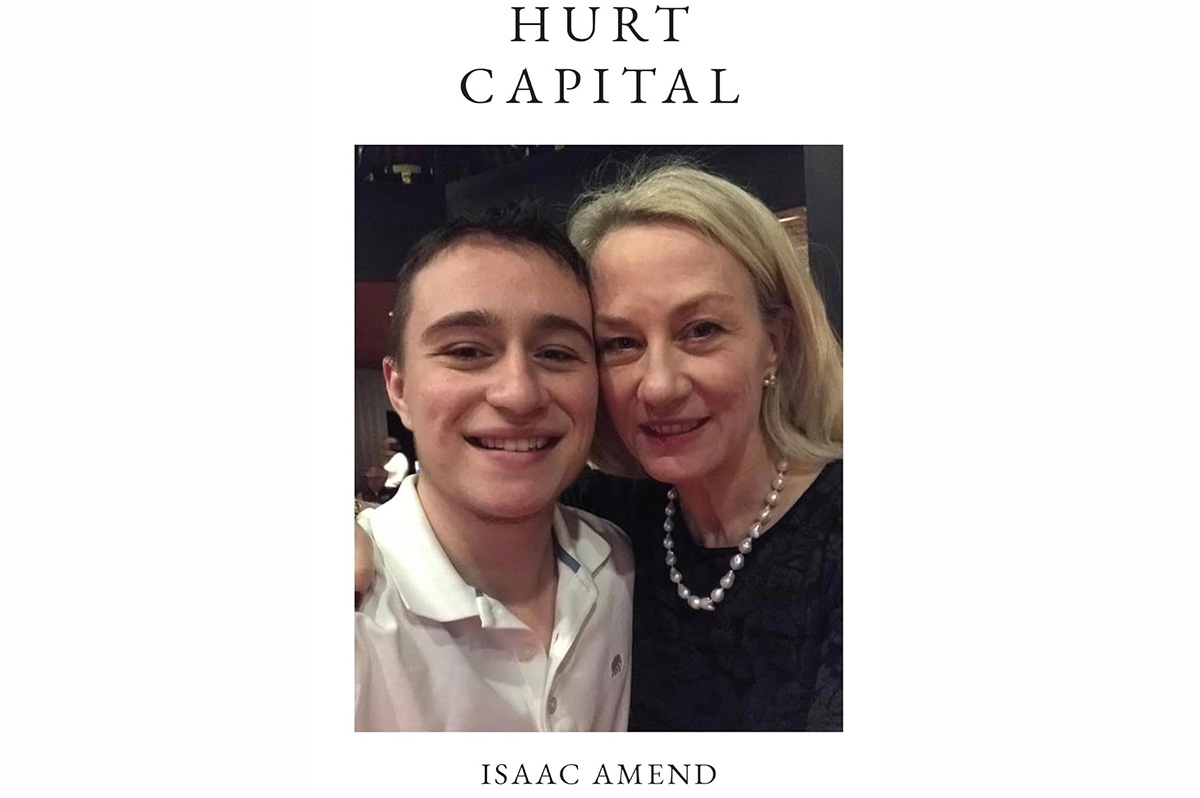
Washington Blade contributor Isaac Amend has published a new book, “Hurt Capital,” chronicling a range of topics related to his transgender status, a personal struggle following a psychotic breakdown, and more.

BLADE: Why did you write this book and why now?
ISAAC AMEND: In college, I was an avid writer for the Yale Daily News, and tried to prepare myself for a good writing career, taking classes with Pulitzer Prize-winner Michael Cunningham, and other notable authors, including Anne Fadiman and Cynthia Zarin. But when I got out of college, I spent six or seven years in the real world, outside of Ivy gates, racking up experiences to write about — whether it was falling in love with a woman, getting hit by a car in Cyprus, or being manic for 13 months straight. But once all of those things were done, I went back to my literary roots, frantically scribbling books and articles in my room at night. Now I want to have some sort of writing career, and I can partly thank the Blade for that, as you welcome most of my op-eds.
I felt like it was important to write about bipolar disorder in very honest and raw terms. I experienced a psychotic break from reality when I was 19 years old that I felt ashamed to tell everyone in my life about, but now I want to come clean with it. Recovering from a psychotic break is a complicated process, and I’ll never really know if my mind has fully recovered, but I do know that because of my break from reality, I’m able to tackle difficult problems in life without getting scared. I feel like it’s also important for the general public to know about how much hurt and pain transgender people feel on a daily basis, hence the name “Hurt Capital.”
BLADE: Who’s the audience for your book?
AMEND: It’s funny, this is a question that all authors need to answer in a book proposal to agents, and I did exactly that, querying dozens of agents. My book has three target audiences. The first are expats, or expatriates. These are people who live overseas — either on embassies in South Asia or in suburban compounds on the outskirts of Moscow. These are the places that I grew up in, and I felt “genderless” for some of my time as an expatriate, frolicking to and fro with not a worry in the world as I grew up in Pakistan and India. I want to connect with other people who have lived overseas.
The second target audience for my book are twins. I have an identical twin named Helen who is my best friend. I’m constantly trying to be a good brother to her, whether it’s helping her move apartments or buying her groceries. We connect on a very deep level, and I’m sure that my gender transition partly shocked her and in some ways, may have made her feel upset. It’s a unique phenomenon when one identical twin wants to be a man, and the other one wants to stay a woman. I’ll never fully understand how God made me bipolar and trans while he made my twin sister non-bipolar and cisgender.
The third target audience for my book are individuals with mental health issues. I want to connect with other people who have also gone through psychotic breaks, been manic, talked at the speed of light, felt depressed, or felt so anxious that they had to pop a lot of pills and stay in bed. I want to connect with people who suffer from schizophrenia, bipolar, ADHD, and OCD, among many other diseases. These disorders are so complicated in nature, but we need to be honest about their dimensions and how to best treat them.
BLADE: How long did it take to write and what was your process?
AMEND: The book didn’t take me long to write. I churned out around 5,000 to 7,000 words in one week, then I had a 500 word per day policy — it’s a policy I implement with all of my books. I would write 500 words per day usually at a bar at night. I was living in D.C. back then and would frequent Nanny O’Brien’s, a well-known Irish dive bar open late. I would pull out my iPhone and write 500 words (but usually more) in Google Docs. There were all sorts of characters at Nanny O’Brien’s — bartenders who would scream at me if I didn’t tip enough, people from the Russian embassy, and famous politicos who would bring their golden retriever in tow. I almost got into a fistfight there with a Russian diplomat, but still miss the memories that bar curated. I even told my landlord at the time that I associated Nanny O’Brien’s with the book.
BLADE: What are you thoughts on how the new Trump administration has attacked trans rights and do you see any hope in the near future?
AMEND: It’s a travesty, what’s going on. The new administration is cruel beyond belief, yet I still retain some semblance of hope for the future. I see our nation as divided, but a nation that still elects an almost equal amount of Republicans to the presidency as it does Democrats. Most large cities in the U.S. are dominated by progressive people who understand the value in diversifying sexuality and gender identities, and celebrating that diversity. I always tell people to “vote with their feet,” as in, if you have the privilege of being able to move to a new location, move to a city that is full of liberal minded people. But many trans youth don’t have the privilege of moving; they are stuck in schools full of students that bully them for their gender. Indeed, there is a massive mental health crisis happening among trans youth. The Trump administration has banned everyone under the age of 19 from receiving gender affirming care, and that is cruel. I have spoken openly about my belief that adolescents and other youth should be able to access puberty blockers, and I maintain that stance.
This seems out of left field, but I’ve seriously thought about pooling money together to pay for trans youth to receive medical care in Canada. It’s sort of a gauche idea, because trans youth presumably need to stay in school in the U.S., and their parents would have to agree to them going up north, but the idea still persists in my head. I guess I dream of ways that these kids can feel better, and receiving care in Canada comes to mind.
BLADE: What’s your message to young trans kids who are frightened during these difficult times?
AMEND: Keep your head up. Older trans people like me are fighting for you to have better lives. If someone tries to put you down in school just remember that they are putting you down out of an insecurity they harbor about themself or the world. Secretly, they feel inferior. Don’t forget that the qualities that you bring to the table — your unique gender and/or sexual identity — is what makes you beautiful.
BLADE: There are many queer memoirs out there; what’s unique about your story?
AMEND: My story is intersectional, meaning I weave a story about a transgender man who is also bipolar and is a twin and grew up overseas in Saudi Arabia, Pakistan, India, Russia, and Jordan. It’s not a one-dimensional story. It’s rich and complicated with tales of being manic and going on testosterone and being psychotic and hoping that I don’t lose all of my marbles in front of my twin and little sister and the rest of my family. I speak of KGB henchmen in Russia and spooks here in D.C. (kind of like that Russian diplomat who almost tried to punch me). I speak of many things—not just being queer.
The following is an excerpt from “Hurt Capital,” which is available now at Amazon and other retailers.
Dear Mom,
The pills in my bathroom cabinet are sitting next to each other like fifteen linebackers on a football field. Bolton. Edmunds. Greenlaw. Wagner. Warner. The Chiefs are winning, and I haven’t even spotted Travis Kelce yet. They’re all famous–each single pill bottle–each capsule I need to swallow with orange juice at night. I get the high pulp kind, now, from Trader Joe’s, that costs around four bucks. Semi pulp doesn’t put the tablets down fast enough. I’ve got every kind of med imaginable since my first episode ten years ago.
Bipolar has never felt so bad. But it’s also never felt so good. The mania that lasted for a year last September has crept away, but its high still remains in my head. At least partly. Partially. Essentially. Basically, it was awesome. I celebrated at every turn. Went walking for hours on end, only to feel my breath creeping into my lungs, and out, past midnight, when I dreamt of fairytales and candy cane land and piles of dollars stacked so high in front of Rick Ross. So high that he forgot he sold coke. I forgot he sold coke. I forgot a lot of that year, Mom.
Iwant to be like Rick Ross one day. I want to star in a song with Drake. Rapping about lemon pepper chicken and taking my celebrity son to French Montessori. I want to be a hustler, a gangster at every turn, a coke warlord just fiending for a kingdom. The kingdom I create is in my mind: it’s ruled by Dostoevsky and Tolstoy and even Pushkin. I named a cat after Pushkin. Russian writers have never felt so real. I want them to come back from the dead and resurrect themselves–all polished and everything. No wax. I remember visiting Tolstoy’s grave with you in Moscow, when henchmen roamed the city at night and CIA officers were prowling the embassy’s corridors. I was scared in Moscow. Scared back then. Scared of my female body. But now it’s a male one, and I’m a son. I’m your son, Mom. But I’m troubled. Very troubled indeed.
I went to a soccer game again. We are named Footyholics. We played near Logan Circle, in the backyard of a school, and I swear the soccer ball was going to kill me. It hit my head, with a bang–not a whimper–and zoomed past some crust on my earlobes. My black stud almost shook for a bit. I clenched the ring you got me on my index finger. You got it from Delhi, and now I’m remembering things back there as well, when you and I lived in India. But there are many things I still can’t remember, Mom. Just trust me on that one. Trust me.
Here’s one thing I do remember, though: getting in that car accident with you. In Delhi. You were all up in the front seat, and Helen and I were in the back. And a motorcyclist went clamp on the right window, and his flesh and blood were splayed all near for us to see. He died that day, and I think that’s the first time I ever saw you cry. I only saw you cry a second time, when Dad was in Kabul, and you missed him like hell, and Phoebe had a tantrum on the National Gallery steps, and you drove us back home, teary-eyed, and you just sat crying that day, in the DC suburbs. And there was not a damn thing I could do about it.
We lost the soccer game. Footyholics lost. But we grabbed a few beers after, at a place near the traffic circle, where expats and missionaries and bankers were fiending for a beer as well, all alike, just as I was fielding for a kingdom in my head. I swear this city is ruled by sociopaths sometimes. They just crawl around here, like ants around a hill, waiting to wreak havoc.
At the bar we were sitting outside, on a wooden table, and we all ordered some beers and some tacos and stuff. And some burritos with chicken. And I swear I shouldn’t drink, but I’m just like your husband–there’s nothing that tastes better than alcohol in this world, Mom. But beer is bad for me. It’s bad for a guy who thinks a soccer ball is going to kill him. At the restaurant, I spotted a street sweeper brushing away leaves. I suddenly fixated on the sweeper: on his crew cut, his black boots, his leather skin. I thought he was manic for leaves. I also thought the waitress hated Jesus until a cross kissed her neck. I thought many things, Mom, and none of them were true.
The Blade may receive commissions from qualifying purchases made via this post.
Books
Bookstores full of LGBTQ-themed new releases
Novels, memoirs, and even a George Takei biography
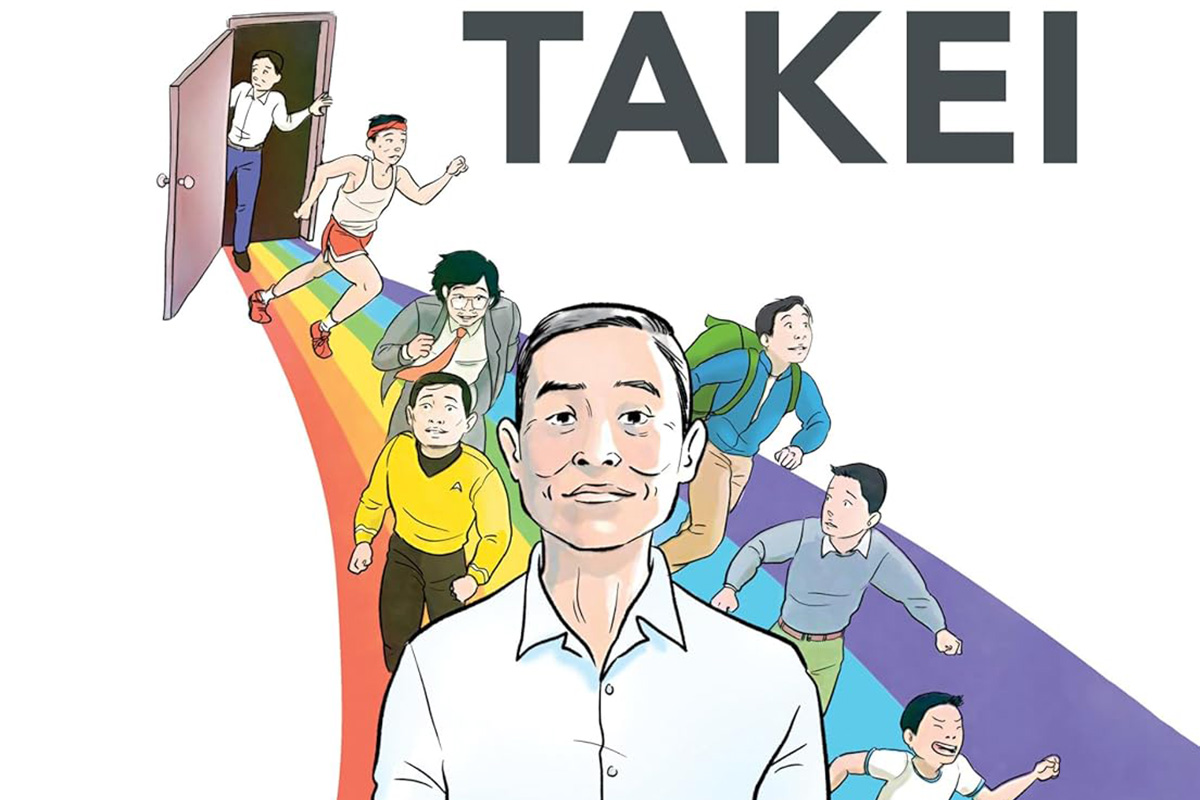
Springtime, where the livin’ is already easy, the sun is warm, the fun is just starting, and the bookstores are full of great new releases like these.
NOVELS
For the reader who wants a thriller with a tinge of realism, look for “Sleeping Children: A Novel” by Anthony Passeron, translated by Frank Wynne (FSG, $27). The year is 1981, and American doctors are baffled by the presence of a disease that’s been popping up. How curious. Across the ocean, French doctors are also seeing the same confusing disease but Passeron’s family – his entire village, in fact – is dealing with addiction in addition to whatever illness is striking gay men. Yes, this is a novel. Keep telling yourself that. Out April 29.
If you’re up for a little romance this summer (and who isn’t?), then look for “Pioneer Summer: A Novel” by Kateryna Sylvanova and Elena Malisova, translated by Anne O. Fisher (Abrams, $27). It’s the story of Yurka, a wild child who’s afraid his time at summer camp is about to be filled with boredom – until he meets Volodya, who’s nothing at all like Yurka. What’s that they say about how opposites attract? This book is said to have been banned in Russia, where the authors are TikTok “sensations.” Out June 3.
So you’re the type who judges a book by its title. Then meet “Everyone Sux But You,” a graphic novel by K. Wroten (Henry Holt, $27.99). It’s a tale of a girl who doesn’t give a, well, you know, about anything but mosh pits, dancing, and her BFF. The two have particularly bonded over a deep loss and that doesn’t help their dark outlook but sometimes, you have to see the bright side of life to really live. Out May 20.
MEMOIRS
Fans of Star Trek or of actor George Takei will absolutely want “It Rhymes with Takei” (Top Shelf Productions, $29.99). It’s a graphic memoir that tells Takei’s story, from childhood to adulthood, about being in the closet for most of his life, and how coming out at age 68 was such a revolution for him. But it’s more than a biography; this book also helps readers understand what it was like to be gay for most of the 20th century and why it’s important to know. Out June 10.
Here’s another must-have for TV watchers: “So Gay for You: Friendship, Found Family, and the Show That Started It All” by Kate Moennig and Leisha Hailey (St. Martin’s Press, $32). This is the story of two women, a show that might have bombed (hint: it didn’t), and the making of a beautiful friendship. If you’re a fan of “The L Word,” the other word you’ll use with this book is L-ove. Out June 3
One more, for TV fans: “Yet Here I Am: Lessons from a Black Man’s Search for Home” by Jonathan Capehart (Grand Central, $30) is a biography from the MSNBC host and member of the Washington Post editorial board. It’s Capehart’s story of fitting in, finding his way to success, and standing with feet in two different worlds. Out May 20.
NONFICTION
If you’re already eyeballing the idea of eating al fresco, then you must read “Dining Out: First Dates, Defiant Nights, and Last Call Disco Fries at America’s Gay Restaurants” by Erik Piepenburg (Grand Central, $30). Once upon a time, meeting new people wasn’t just done in bars or nightclubs. Piepenburg says that even a century ago, gay restaurants were great places to make new friends, find new loves, and have a good meal, too. This fascinating book takes you around the country and through the decades, and it’s a fun, fun read. Out June 3.
And when times are bad and you’re feeling low, you’ll want to pick up “Generation Queer: Stories of Youth Organizers, Artists, and Educators” by Kimm Topping and Anshika Khullar (Lee & Low, $22.95). It’s full of inspiring stories of young people, teen leaders, under-30 folks who want to represent and make change. The short biographies in this book are quick to read and they’ll help you understand that the next generation is not about to let things slide backwards. Out May 27.
If these great books aren’t enough for you, be sure to talk to your favorite bookseller or librarian. There are lots of books out this spring and coming for summer, and you’re not going to want to miss them.
-

 District of Columbia4 days ago
District of Columbia4 days agoFinal push to raise funds, fill D.C. hotels as WorldPride nears
-

 El Salvador2 days ago
El Salvador2 days agoGay Venezuelan makeup artist remains in El Salvador mega prison
-

 District of Columbia4 days ago
District of Columbia4 days agoReenactment of 1965 gay rights protest at White House set for April 17
-

 Maryland4 days ago
Maryland4 days agoFreeState Justice: Transgender activist ‘hijacked’ Moore’s Transgender Day of Visibility event

